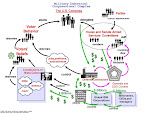We have been working to stop wars. Implicit in *every* action we have done, or word spoken, is an assumption that what we have done has helped stopped war, within a bunch of other assumptions about what causes wars. Right?
Maybe it is time we stopped asking the question, "What are the causes of wars", and simply investigate the *process* of wars.
If you have ever done much reading on the topic of causality, itself, you'll agree that determining the "cause" of anything is is a challenging question. For the briefest time, please look at the Wikipedia article on Causality.
http://en.wikipedia.org/wiki/Causality
To my mind, the word "Causality" itself, or at least my concept of its meaning, is a dead end. It gets you going off on the wrong direction, somehow. it almost implies purpose, or meaning, or some sort of cosmological order to the universe. Of course, there are many principles that are quite reliable in understanding or predicting the world--we are not living in a chaos. But there are unknowns.
I have been studying the Wikipedia article on War, finding it quite deficient and unsatisfying. TO understand my comments, please spend a few minutes reading the article. http://en.wikipedia.org/wiki/War
There have been at least 10,000 revisions to the page in the last 3 or 4 years alone. Go ahead and page through some of them, with the History function shown on the Article.
Obviously, there are many people and organizations with a great deal of money and other things at stake, should the public ever achieve a general, well-balanced understanding war.
Here is a much better examination of the causes of war, On the Causes of War. New York, Oxford University Press, 1996. 235 p. http://www.google.com/search?q="on+the+causes+of+war"+Hidemi+Suganami
And another, Download FREE .pdf version of "On The Causes of War," 289 pages, (1.35Mb). An outline of the book chapters can be seen below. ... http://www.gzmn.org/causes.htm
War can be understood and described at the physical and mechanical level, without difficulty. The movements of people and weapons, the places where it happened, and the dates and aftermath are so easily recorded. Historians and other observers, do this quite reliably after every war.
Unsurprisingly, authors of the Wikipedia article have published a decent definition of war, in the physical sense.
Similarly, before and during the process of war, a vast collection of physical things and events are easily observed having direct contact or connection with the physical war. Obviously, people and weapons and material are organized, produced, transported, etc. before and during the fighting, bombing, killing, etc. The processes immediately preceding or adjacent to war itself, are easily observed.
In any investigation of causes, a problem of boundaries always arises.
Determining the causes of things always has this problem, it's not unique to investigation of wars.
The war process is not easily distinguished from the indigenous process of the country. The origins of every bit of physical material and every person involved in fighting and supporting the war can be traced back in time, to less and less connected people and things, to a point where they are indistinguishable from other people and material indigenous to the land and people of the country that are not involved in war.
Recognizing this fact, one should trace, and analyze, the material process of war only so far as necessary to answer necessary questions. You have to have a clear idea of what questions are necessary to ask. For example, I would suggest, the most important question is *whose* actions are effective and determinative in the stages of the war process, at which the pot boils over, and the train has left the station, etc. I assume neither that these people are numerous, nor that they are few (i.e. conspiracy theory) but rather, those people *must* be identified at least as a class, in order for the next phase of inquiry which is at the level of motivation, psychology, will.
As i said above, the processes of the wars engaged in by the U.S. during my lifetime have not been hard to observe or describe. The definition of "war" is available and accessible.
A process once recognized, is susceptible to interruption, impedance, resistance, attenuation, blockage, redirection or 100 other things.
Monday, June 1, 2009
Subscribe to:
Post Comments (Atom)

No comments:
Post a Comment